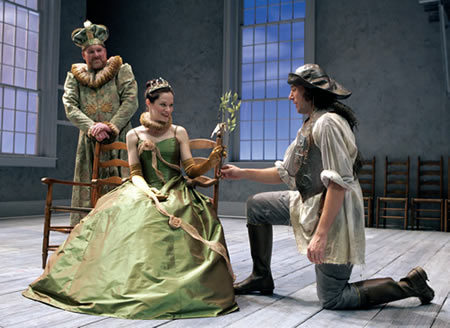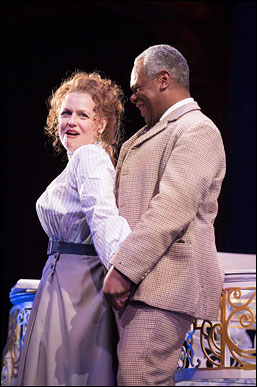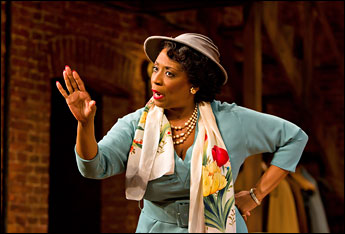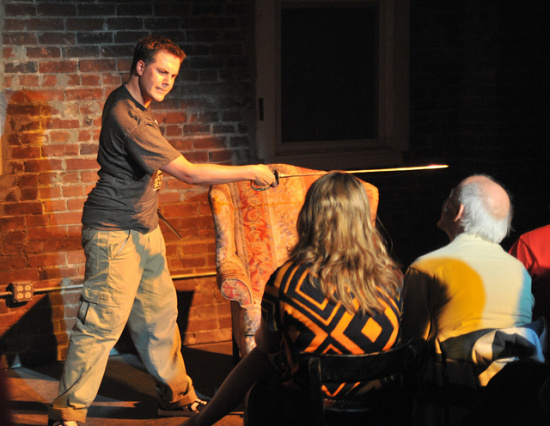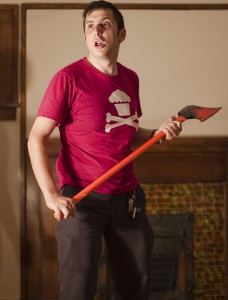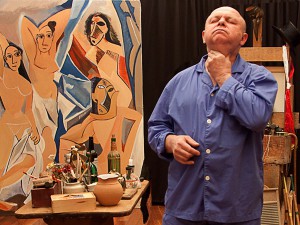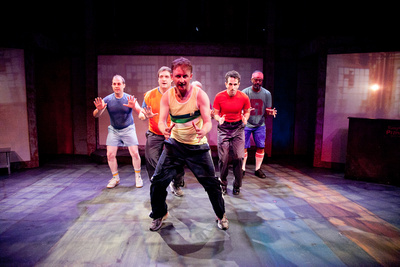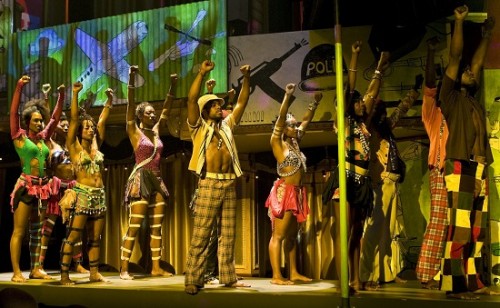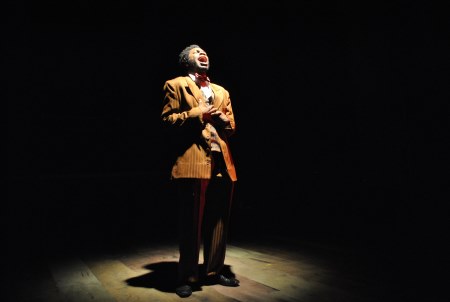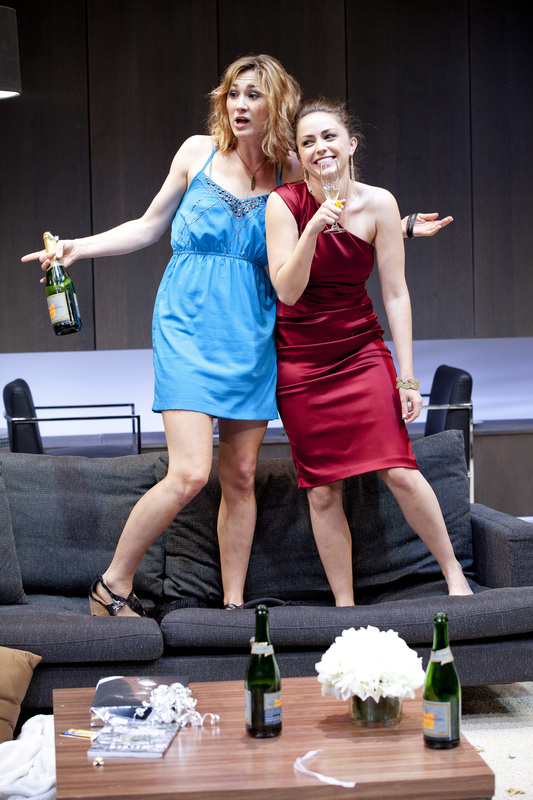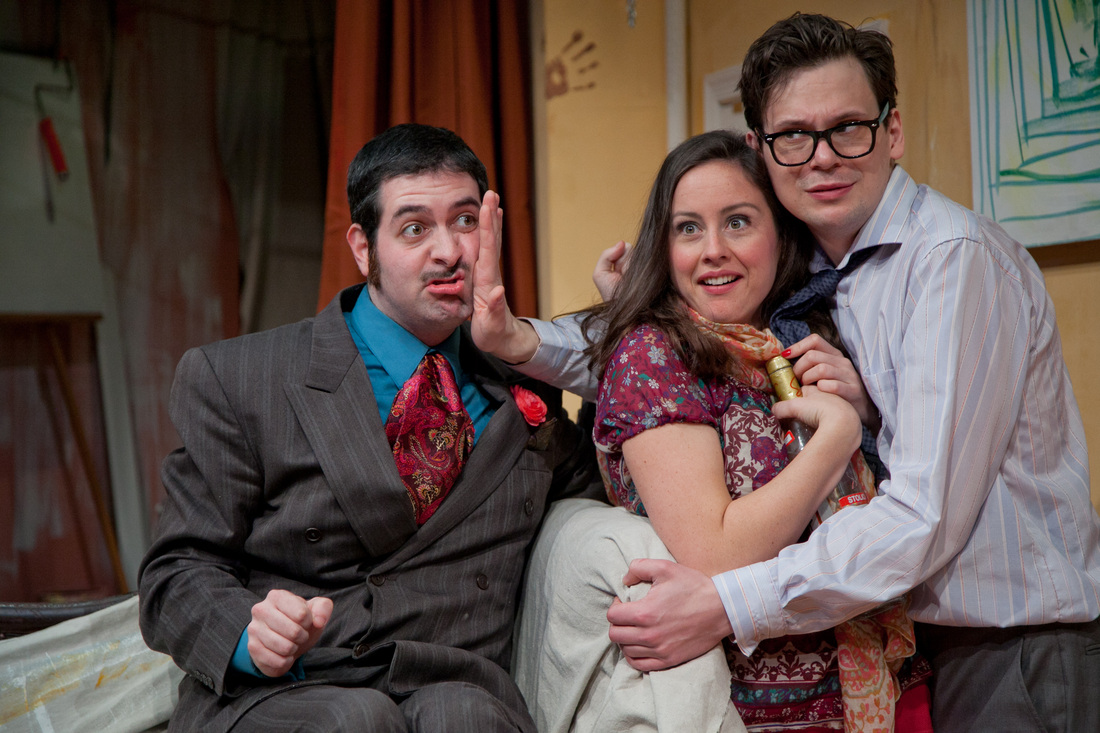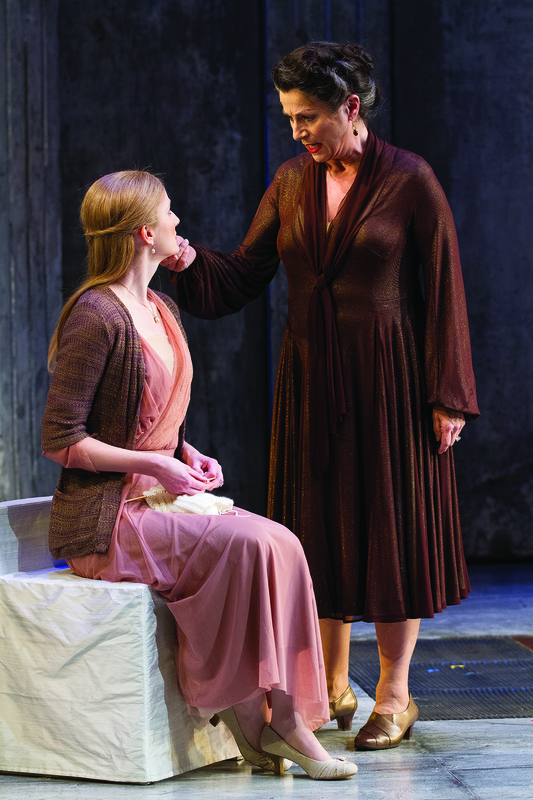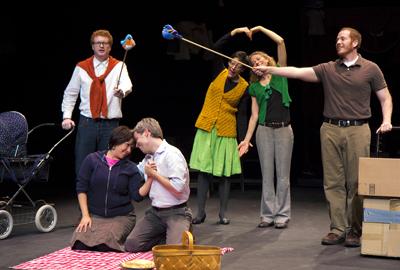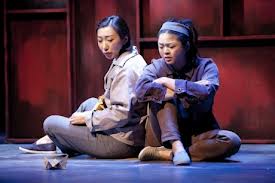|
JACQUELINE LAWTON: Why did you decide to get into theatre? Was there someone or a particular show that inspired you?
JAYNE BLANCHARD: I have been going to the theater as long as I can remember. My mother took my sister and I to a children’s theater at the Baltimore Museum of Art and I guess I must have been around 3 when we saw the first play, Androcles and the Lion. I loved it so much I insisted my mother take me up to meet the actors and when I shook the Lion’s velvety paw, that was it. I was hooked. My parents also used to take us to New York on the train to see musicals and I remember seeing Gypsy, Promises Promises, and You’re a Good Man, Charlie Brown when I was little. My parents had recordings of every Broadway show, it seems, and we would listen to the records in the living room as a family. JL: How long have you lived and worked as a theatre critic in D.C.? What brought you here? Why have you stayed? JB: I have been a theater critic here for 14 years—hard to believe! I am a hometown Baltimore girl and in the 80s and early 90s lived in DC and worked as a movie critic and culture writer. I returned to the area in 1999 and found work at the Washington Times as a theater critic. This place is my home. I have so enjoyed watching the theater scene here grow and grow up. The Baltimore-Washington area as a theater destination seems to have come into its own. JL: How do you define the work you do? Specifically, what is the role of the theatre critic in the world of theatre? What contribution do you hope to make in the D.C. Theatre community and the American Theatre? JB: I approach the job as critic in many ways. First as a reporter, who is giving the reader a taste of what it was like to see a particular show at a particular point in time. Many readers experience theater through reviews and if you can give a sense of what it was like to be there and see, hear and feel what will never be repeated again, I think you have fulfilled some of what theater criticism entails. Next, a review should closely examine the play and the production. Does it succeed within its genre—which can be as simple as saying it is funny (and why) if it is supposed to be a comedy. How does it hold up structurally? Do all of the different parts work, either individually or as a whole? Is it a good story? Do the characters draw you in? Do you learn anything from the production or does it expand your perspective in any way or reinforce what you already know? Has the show changed you in any way? I see criticism as asking yourself a series of probing questions and answering them to the best of your ability. My contribution to the DC Theatre Community would be one of support and also giving people a sense of what it was like to experience a production. I also think it is important to contribute a woman’s voice, since there are not that many of us out there. JL: If your work as a theatre critic doesn’t pay the bills, what else do you do? How do you balance this work with your play viewing and criticism? JB: I supported myself as a critic, arts/culture writer and freelance writer and editor since I was 21 years old, but the newspaper, magazine and publishing industry has changed so much I couldn’t do it anymore. About 6 years ago, I became a writer and editor for Johns Hopkins University and now I work for a health care company writing and editing. I wish I could be immersed in the world of the arts all the time, but the sad truth is that I can’t afford it. But in a way, working full time makes me more like the typical audience member who may be tired, stressed and preoccupied before the curtain goes up and may just want to escape for a few hours into another world. JL: What skills and traits do you feel a successful theatre critic should have when writing about theatre, especially when it comes to new plays? JB: For new work, it helps to be open and open-minded. You don’t want to come in with pre-conceived notions, if you can help it. I think reading the play first helps if you can get a hold of the script. The danger with that is that you may have formed ideas about how the play should be staged or what it looks like in your mind, but you can try to push those thoughts out of your head when actually seeing the play. To me, it really helps to read the play first and get some sense of the characters and the plot so you are not sitting there thinking “Who is Sid again?” and “We’re in Prague, right?” and not concentrating on what is happening in front of you. JL: What is your writing and viewing process? Do you read the script prior to seeing a production? Do you research the author and/or world of the play? Do you read the program notes? JB: It varies, depending on how much time I have. At the very least, I read the program notes and see if there are articles (not reviews) on the play, author and/or production beforehand on the Internet I can look over. Sometimes, I reread plays I am familiar with, particularly if it is something I have a vague recollection of and/or I have a memory of it that may be unreliable. For instance, I reread one of my favorite books, The Portrait of Dorian Grey, before the production at Round House because I wanted to re-acquaint myself with Wilde’s purple prose. And man, it is Gothic and over-the-top and I guess I didn’t remember it as that purplish when I read it as an angst-y teenager. But the production’s excesses were pitch-perfect to Wilde’s prose—audiences and critics may not have liked it (I thought it was fabulous), but it was spot-on! JL: In the article, “Ohio Critic's Tough Words Elicit Rough Reaction,” Denver Post Theater Critic John Moore states: “There is no universal rule book for criticism, no how-to manual. My guidelines: Be true to your visceral emotional response, good or bad. State your case and back it up. Be a catalyst for discussion. Encourage dialogue. Don't be personal. Never try to be funny at the expense of someone's feelings.” What guidelines, rules or standards do you have for your own work? Have you always upheld them? If so, at what cost? If not, what shifted the line for you? JB: I agree about being true to your instincts and visceral emotional response, good or bad. If you can’t trust your instincts and response, what can you trust? And also you need to acknowledge the lack of an emotional response—to me, theater is supposed to move you, make you feel something, re-arrange your nerve endings, make you see something through new eyes, feel it through new skin. If it doesn’t, you saw something but it wasn’t theater. I also believe that theater criticism should be lead to a larger discussion whenever possible. It isn’t the be-all and end-all. Reviews are part of the theater experience for many people. In my reviews, I try to uphold the journalistic standards that have been drilled into me since college: Tell the truth. Get the facts right. Check your sources. Be tough but fair. Don’t be on the take. Disclose your biases upfront. Use the 5Ws and 1H to craft your reviews. Remember that theater people are not friends you want to impress so you will be considered popular—they are part of a beat you cover. I try to maintain these at all times. Maybe I am fuddy-duddyish to approach theater criticism from a newshound or reporter perspective, but that’s the way I was trained. Too late to go back now. JL: What is the greatest part of being a theatre critic? What has been your most difficult challenge? JB: The greatest part is when the curtain goes up and you wonder what is going to happen. It is like turning the knob on a hotel room and not knowing what is there—that mystery, that anticipation. Also, it is a privilege to be a part of the theater scene—to be a member of the audience seeing all these wonderful productions and actors. The most difficult challenge can be energy and motivation. I drive from Baltimore and sometimes it takes forever to get to DC and then forever to drive home and I wonder exactly why I am killing myself for theater. It is also a challenge to gear myself up for long shows—perhaps that makes me hopelessly bourgeois but the prospect of a 4-hour production does not make my socks roll up and down. However, when a show is extraordinary, like August Osage County or the three-act Who’s Afraid of Virginia Woolf? or Peter Brooks’ The Mahabarata, the time flies by like a song. I admit I sometimes find it difficult to rise from the couch to see a play or musical for the gazillionth time. I really am “Romeo and Juliet-ed” and “Les Miserables-ed” out—although I am willing to be surprised. JL: Who are your favorite playwrights? What is it about their work that inspires or draws you to them? JB: I love Harold Pinter, Tom Stoppard, Edward Albee, August Wilson, Caryl Churchill, Naomi Wallace, Suzan Lori-Parks, Stephen Sondheim, Tennessee Williams, Tony Kushner, Arthur Miller, Wendy Wasserstein, Sarah Ruhl, Lynn Nottage, Mary Zimmerman, Bryony Lavery, Michael Hollinger, and all the Jacobean tragedians—love Jacobean tragedy. It is my guilty pleasure. I am sure there are more playwrights, but I can’t think of them all right now. JL: DC artistic directors … JB: Michael Kahn, Kwame Kwei-Armah, Howard Shalwitz, David Muse, Eric Schaeffer and I am totally a fan of the Baltimore Rock Opera Society. JL: DC actors, designers and directors are .. JB: Radiantly talented! John Vreeke, Rebecca Taichman, Michael Kahn, Tony Cisek, Bobby Smith, Nancy Robinette, Jennifer Mendenhall, Will Gartshore, Jenna Sokolowski, Susan Lynskey, Debra Hazlett, Helen Hedman, James Flannigan, Sherri Edelen, Ted van Greithuysen, Floyd King, Frances Jessica Dukes, Erika Rose, Tim Getman, Marty Lodge, Laurence O’Dwyer, E Faye Butler, Thomas Jefferson Byrd JL: DC playwrights are… JB: Promising and out there working away and getting produced, which is great. My all-time fave DC writer is Joan Cushing—an excellent command of story and character. But I also admire Harry Bagdasian, Psalmayne 24, Renee Calarco and John Strand. JL: DC audiences are ... JB: Intelligent and responsive. They can’t stay away from their gizmos however—they tend to check their phones, ipads and tablets constantly during shows and texting if they get bored. Don’t they realize how rude that is, to both the audience and the actors? JL: How do you feel the DC theatre community has addressed the issues of race and gender parity? How has this particular issue impacted you and your work? JB: I still think it’s weird that DC doesn’t have a major African American theater company that has been around for decades. I mean for Pete’s sake, there are two in the Twin Cities in MINNESOTA--Penumbra in St. Paul and Mixed Blood in Minneapolis. And we still have a tendency to cram black theater into Black History Month and feel like we’ve done our job. Gender is harder because it is so ingrained. We definitely need more women directors, artistic directors, dramaturgs, etc. And playwrights—I am always shocked when a male critic disparages women playwrights such as Wendy Wasserstein with a total lack of respect for what she achieved and her contribution to American theater. Such blithe hatred and disrespect for her and other women playwrights—it takes my breath away. But then, as I said it is so ingrained. I was looking up the spelling of a woman playwright’s name and came across an alphabetized list (510 entries) of famous women playwrights through history. It was alphabetized—by first name. Yep, Aphra Behn was in the “As” and Suzan-Lori Parks was found with all the other Susies and Susan’s in the “Ss.” Are you kidding me? Can you imagine a list of male playwrights by the diminutive first name—Chekhov under “A” for “Anton” and Shakespeare with all the Wills and Wilfreds? JL: What advice do you have for an up and coming DC based theatre critic who has just moved to the area? JB: See everything you can, read everything you can and keep at it. Above all, be honest and true to yourself and what you feel.
2 Comments
JACQUELINE LAWTON: Why did you decide to get into theatre? Was there someone or a particular show that inspired you?
SOPHIA BUSHONG: I got into theater to be an actress. I was inspired by TV when I was 5 or 6. I saw John Hillerman, who I recognized from Magnum P.I., play an historical figure on some television movie. At first I was confused, so my mother explained what actors do. I was hooked from that moment forward. My family lived in a small town in Colorado, so we didn't attend theater very often. I do remember the first play, of sorts, that I saw. It was a performance about Neanderthals put on at the science museum. I pursued acting from that point on- spending many years working in New York and regional theaters- until about two years ago, when I turned my attention towards writing. JL: How long have you lived and worked as a theatre critic in D.C.? What brought you here? Why have you stayed? SB: I don't consider myself a critic. I've written reviews for the City Paper Fringe and Purge blog during the Capital Fringe Festival. I began contributing to the Arts Desk blog about 16 months ago, writing about new play development and process. I got involved with Fringe and Purge shortly after moving to DC three years ago, because I wanted to get acquainted with the theater scene here, as well as practice the discipline of writing. Being both a writer and an actress was always a challenge for me. I would start creative writing pieces then set them aside for months at a time when I got cast in a play. As you might imagine, my stories have not been well served by my working in this manner. I review very rarely for City Paper outside of Fringe and Purge. I'll do it only when there are a lot of shows opening in a single weekend and they need all hands on deck, so to speak. I have been cautioned against trying to be both a critic and an actress in this market. I understand why, though it saddens me a little. I have been cautioned by people who have my best interests at heart. I'm not willing to make a choice that will prevent me from returning to acting. I did both in New York, but New York is such a huge town. As long as you don't get famous for either pastime, nobody cares. The city just absorbs it all. JL: How do you define the work you do? Specifically, what is the role of the theatre critic in the world of theatre? What contribution do you hope to make in the D.C. Theatre community and the American Theatre? SB: A great critic can be a catalyst for thoughtful, honest public discussion. They can be an observer of artists conversing with one another, through their art, across borders and generations. By articulating what they see, hear, and feel at a performance they can expand the awareness of young or less experienced audiences. JL: If your work as a theatre critic doesn’t pay the bills, what else do you do? How do you balance this work with your play viewing and criticism? SB: I've never paid all my bills with my creative work. I was just successful enough to have a complicated tax return. As I mentioned, balancing my different creative passions and devoting enough time to each is a constant struggle. I would not say I have achieved a satisfying balance at all. JL: What skills and traits do you feel a successful theatre critic should have when writing about theatre, especially when it comes to new plays? SB: I try to view a new play with an open mind. I try to identify what the playwright and the creative team want to share with the audience and whether they have done so with clarity and insight into the human condition. If I had to pick one trait that a critic should have, or one that I look for when choosing whom to read, I'd say a lack of snobbery. I don't think someone with a narrow definition of what is "good" or "bad" art can be of much service to a diverse community of readers and theater- goers. JL: What is your writing and viewing process? Do you read the script prior to seeing a production? Do you research the author and/or world of the play? Do you read the program notes? SB: I do all of those things. Offering historical and artistic context is very important. I always write as if my reader is reading their first review, or their first piece about the process of creating theater. As if it's the first time they are learning about a particular play or playwright. Perhaps they are thinking about buying a ticket for the first time. JL: In the article, “Ohio Critic's Tough Words Elicit Rough Reaction,” Denver Post Theater Critic John Moore states: “There is no universal rule book for criticism, no how-to manual. My guidelines: Be true to your visceral emotional response, good or bad. State your case and back it up. Be a catalyst for discussion. Encourage dialogue. Don't be personal. Never try to be funny at the expense of someone's feelings.” What guidelines, rules or standards do you have for your own work? Have you always upheld them? If so, at what cost? If not, what shifted the line for you? SB: I agree with all of that- that's a great set of guidelines. I think about which "cap" I have on. I have spent most of my life as a theater- maker rather than a critic, so I think consciously about the fact that my readers are the audience to whom I have a responsibility, not the artists behind the play. That said, I do try to see what was good in a production, what worked well, where there is talent to encourage, even if the show overall isn't successful. Because I have been on both sides of this equation, giving and receiving, both positive and negative critiques, I can comment on John's last point in particular. In general I wish the actor/ critic relationship was better understood on all sides. Actors often see the critic as an enemy. I have met and worked with a number of theater critics now. I don't find them to be negative or spiteful people. I believe most are doing this because they love theater. Writing reviews is challenging, time- consuming work that usually doesn't pay well and often makes people hate you. I wish actors would remember that there is little incentive to be a critic for someone who doesn't want the best for theater. JL: What is the greatest part of being a theatre critic? What has been your most difficult challenge? SB: Personally, I love seeing, writing, and thinking about theater. I always go in hoping to see something great. Something I get to tell everyone is well worth an investment of time, energy, and money. That said, getting a negative review hurts and is humiliating. It's that simple. A critic has power that they should wield responsibly, while being honest with their readers. I also believe that if the goal of artists and critics alike is to be of service to Theater, to encourage the creation of great theater, that getting personal in a review defeats that goal. During one Fringe festival, I reviewed a show that was terrible. It was offensive, horribly written and performed, and I was angry when I left the theater. However, in my review I tried to be honest but thoughtful and bear in mind that the artists intended to make something good. Another publication lambasted the show and everyone involved. An online argument ensued. That critic wrote, I have to be honest, the review I was tempted to write. A review much like one I did write but didn't turn in. But watching the online argument taught me something. Getting personal in a critique makes artists defensive, dismissive of a critic's valid and insightful points, and more likely to continue making bad theater. As an actor I've learned a bit about recovering from a bad review. I got a bad review from one of the critics likely to be contributing to this blog series, in fact. I was hurt when I read it and took some time to lick my wound. I recall that the word used to describe my interpretation was "shallow." (And no, I'm not going to re- read it now to check.) However, because she didn't make it a personal attack, I had to step back and ask myself, "Is she right?" I believe to some extent yes, and to some extent no. Part of the playwright's intention was to reject the shallow values my character represented. However, I did find passages where I was able to make my character's arguments clearer. She felt betrayed by those around her I tried to bring more of that out after absorbing the critique. Her negative review improved my performance. As an actor, you always have the opportunity of the next performance. Reviews come out at the beginning of a run. Once a review is published the critic is done, though they may have new and more interesting thoughts about the show for a long time after. The actor gets to keep working, keep improving the quality of the work. There's power in that. JL: Who are your favorite playwrights? What is it about their work that inspires or draws you to them? SB: Shakespeare, Ibsen, Schiller, Williams, Hellman, Zimmerman. Poetry in dialogue draws me. I find people to be very poetic, innately, even when the poem is horrifying or vulgar. Humor. Continued relevance. I'm not sure how to put this- a great play can withstand the rigors of reinterpretation by many and diverse artists. For actors, all your questions can be answered within the text. The human condition you must portray is there in the words for you to discover. Artists bring their ideas to the rehearsal hall, but a great play is always the strongest "personality" in the room. JL: DC artistic directors are… SB: Progressive, ambitious. JL: DC actors, designers and directors are ... SB: Fortunate to be working in a supportive community, hard- working, innovative. JL: DC playwrights are … SB: Prolific, talented. JL: DC audiences are ... SB: Intelligent, enthusiastic. All are extremely culturally and politically conscious. The intelligence and political savvy I see in the audiences permeates the work being made here in a wonderful way. JL: How do you feel the DC theatre community has addressed the issues of race and gender parity? How has this particular issue impacted you and your work? SB: I see this community doing everything it can to make audiences aware of the lack of gender and racial parity in theater. I see many companies working to improve those stats in their own houses, through outreach and choice of material. I've had the opportunity to write about these efforts a few times, which is always satisfying. JL: What advice do you have for an up and coming DC based theatre critic who has just moved to the area? SB: If I ever feel that I've achieved better balance personally, maybe I'll offer advice. I have learned a thing or two that helps me both as a critic and an actress: Be of service to the play and your audience, spend no energy quantifying what benefits you might get, or did get, out of the experience. Trust your instincts. Keep going. JACQUELINE LAWTON: Why did you decide to get into theatre? Was there someone or a particular show that inspired you?
VICTORIA DURHAM: I have a degree in Film and Media Arts. For years I worked in video production in various capacities, but always felt slightly unfulfilled in my work. I remember going to see a friend perform in a Fringe show and suddenly the light bulb went off in my head. Theatre offers something raw, organic and unfiltered that movies do not. The live component of watching something occur in real time is exciting. There’s a bravery in it that I find deeply inspiring. JL: How long have you lived and worked as a theatre critic in D.C.? What brought you here? Why have you stayed? VD: I’m originally from the DC Metro area. I attended college in Philadelphia, but decided to return home to work in video production. There were just more opportunities in that field here than there were in Philadelphia at the time. That was over ten years ago. Before I decided to seriously pursue a career in theatre, I actually considered moving to the west coast. However, I changed my mind when I realized that Washington’s theatre scene is one of the strongest in the country. I’ve only been a theatre critic for a little over a year, but let me tell you, DC’s vibrant arts scene has kept me very busy. JL: How do you define the work you do? Specifically, what is the role of the theatre critic in the world of theatre? What contribution do you hope to make in the D.C. Theatre community and the American Theatre? VD: The role of the theatre critic is to speak for the audience, to let theatre makers know what people think of their work. I really want to be known as an intelligent and thoughtful who critic who sought to help theatres do their absolute best work. I want my critiques to remind theatre companies and playwrights to create conscientious work that accurately reflects the diversity of the world around them. JL: If your work as a theatre critic doesn’t pay the bills, what else do you do? How do you balance this work with your play viewing and criticism? VD: One of these days I’ll figure out how to turn my work as a theatre critic into a full-time paying gig. For now I work as an account manager at a trade litigation consulting firm by day. I am however, contemplating getting a job at a local theatre. I’d like to immerse myself into that world a bit more. Still, it isn’t difficult to balance play viewing and criticism with my current occupation. The theatres in DC are extremely accessible. Occasionally I’m forced to sacrifice a few hours of sleep in order to get a review written on time, but hey, that’s the gig. JL: What skills and traits do you feel a successful theatre critic should have when writing about theatre, especially when it comes to new plays? VD: I think that good theatre critics lead broad and diverse personal lives. You’ll write better informed critiques that way. Being open-minded, culturally informed and detail oriented make for a strong critic as well. A good critic also notices what the casual viewer doesn’t. He/she sees the subtleties, nuance, etc. of a work. JL: What is your writing and viewing process? Do you read the script prior to seeing a production? Do you research the author and/or world of the play? Do you read the program notes? VD: I don’t read scripts prior to seeing a production. If the playwright and producing theatre have done their jobs, then I won’t need to do so. But I definitely read program notes and often research a play’s background, context, history, etc., especially if the subject matter is unfamiliar to me. A great example is the play, “Copenhagen,” by Michael Frayn. At its core, the story is about human relationships and the precariousness of memory. Yet there is a lot of scientific terminology included in the script because the characters are nuclear physicists. I had to give myself a little refresher course in Chemistry 101 just so I could keep pace with the plot and dialogue. When a play begins, my first objective is just to get the gist of who the key players are and to get a general sense of the plot. After that I allow myself to notice the production’s creative and technical elements, ie. set design, costumes, sound, etc. It’s not until I’m sitting alone with my laptop that I consider the play’s theme, cultural relevance, timeliness or even if I liked the show. I definitely need a minute to digest the material before I begin writing. JL: In the article, “Ohio Critic's Tough Words Elicit Rough Reaction,” Denver Post Theater Critic John Moore states: “There is no universal rule book for criticism, no how-to manual. My guidelines: Be true to your visceral emotional response, good or bad. State your case and back it up. Be a catalyst for discussion. Encourage dialogue. Don't be personal. Never try to be funny at the expense of someone's feelings.” What guidelines, rules or standards do you have for your own work? Have you always upheld them? If so, at what cost? If not, what shifted the line for you? VD: I work very hard to ensure that my reviews are written with great tact, respect and sensitivity – no brash and discourteous commentary, EVER. Even if I hate a show, I’ll state my opinions respectfully and will give concrete examples to back up my critique. I’m not here to kill dreams or to lambast anyone’s hard work. Perhaps I’m one of the more kind (but honest) reviewers out there because I come from a creative background myself. I write fiction and plays too so I know how useless, mean-spirited reviews can be. JL: What is the greatest part of being a theatre critic? What has been your most difficult challenge? VD: The best part of being a theatre critic is that I get to witness and experience so much talent on a regular basis. I love that I get to let theatre makers know what their audiences are thinking about their work in an articulate manner. The most difficult part is knowing that I may potentially offend an artist with my critique even if it is thoroughly and kindly expressed. I also cringe when artists say that the opinions of theatre critics don’t matter. What we do is an art form in its own unique way and a well written critique requires a lot of brainpower and hard work. That said, I’d like the theatre community to include critics in their discussions a bit more. We really aren’t the enemy. JL: Who are your favorite playwrights? What is it about their work that inspires or draws you to them? VD: I am just a little bit obsessed with Tennessee Williams. His writing is always sultry and sexy and musical. His characters are so emotional and deeply flawed, yet somehow beautiful at the same time. I must have seen and read “Cat on a Hot Tin Roof” a hundred times. I’m also a big fan of Alan Ball. Ball does oddball, damaged, slightly off kilter like no other. His short play, “Five Women Wearing the Same Dress” is one of my favorites. JL: DC artistic directors are … VD: Aware of their strengths and weaknesses. They are constantly thinking of ways to diversify their audiences, content, production staff, etc. JL: DC actors, designers and directors are … VD: Resourceful, innovative and crazy talented. I’m a little in awe of how many rising starts that are floating around Washington. JL: DC playwrights are … VD: Underrepresented in the Washington area. I’d love to see more work by local playwrights produced at professional theatres. I know that this issue is slowly being addressed; initiatives by venues like Theater J come to mind. Good news is local writers are great about making sure their work is being seen even if the heavyweight theatres aren’t producing them. There’s always a play reading happening somewhere and I’m constantly meeting playwrights who have launched their own companies and troupes. JL: DC audiences are ... VD: Open-minded and extremely intelligent. They get the joke, the pun, the innuendo. JL: How do you feel the DC theatre community has addressed the issues of race and gender parity? How has this particular issue impacted you and your work? VD: I think the DC theatre community is aware that there’s an imbalance and is taking baby steps to solve the issue. A lot of theatres have developed diversity initiatives designed to give talented and underrepresented minorities a voice. In the meantime I think that minorities are simply creating their own avenues. They’re renting out spaces all over the city and staging shows themselves. As a theatre critic, I feel the parity much more deeply as an African-American than I do as a woman. There’s no shortage of white, male critics and there’s a decent population of female critics as well. But I rarely meet Black critical writers. There needs to be more of us. As a Black writer, my opinions and critiques are informed by a perspective completely different from those of my male, White colleagues. That’s good. That’s important. The reviews you read in the paper or online should reflect that. They should be just as diverse and well-rounded as the selection of plays produced each season. JL: What advice do you have for an up and coming DC based theatre critic who has just moved to the area? VD: Do your homework and learn everything you can about both local and national theatre trends. Before you write a single word, consider that a lot of blood, sweat and tears have gone into the work you are reviewing. Careless, snarky quips do nothing to improve an artist’s or a theatre’s work. Back up every critique you make with concrete examples. Be willing to review ANY show. If you have the opportunity to cover a star studded show at Arena Stage, great, but the area’s smaller venues and community theatres are doing lovely work as well. Volunteer to write reviews for Capital Fringe. Pace yourself and eventually you’ll find your rhythm. Remember to enjoy the show you’re reviewing too. Sometimes I’m so consumed with note taking and analyzing a play that I forget that it’s meant to be a fun experience. JACQUELINE LAWTON: Why did you decide to get into theatre? Was there someone or a particular show that inspired you?
RJR: I wouldn’t say I’m from an artsy family, but I am from a family that loves music and musicals. In the 1980s, my Grandfather Stein was active in a Baltimore-based community theater called the Senior Star Showcase. So my earliest theatergoing memory is seeing my then-septuagenarian grandfather playing Ali Hakim in Oklahoma. JL: How long have you lived and worked as a theatre critic in D.C.? What brought you here? Why have you stayed? RJR: I moved to DC in 2007 to take a two-year contract position at the National Endowment for the Arts. I wrote a few theater previews for the Post later that year, and always looked for ways to cover DC theater for publications in other cities. (Reviewing the August Wilson cycle for the Post Gazette, interviewing a Maine congresswoman who acted in “Will on the Hill” for the Press Herald, etc.) In 2011, I started regularly reviewing theater for City Paper. JL: How do you define the work you do? Specifically, what is the role of the theatre critic in the world of theatre? What contribution do you hope to make in the D.C. theater community and the American theater? RJR: Theater journalists should be knowledgeable audience members with specialized writing skills. In my case, I’ve been writing about theater professionally for 13 years (19 if you count my student years) and have a master’s degree in arts journalism. I’ve studied drama from a literary perspective in college, and from an actor’s perspective in grad school, so I’d like to think I offer an informed viewpoint. A few months ago, TheatreWashington’s Rachel Grossman interviewed Post critic Peter Marks, and they came up with a cool Venn diagram depicting Peter’s observatory role. I rather liked that. I’m writing for the people who are thinking about buying tickets; in the case of City Paper, I imagine culturally vociferous young professionals. I’d like to think I’m helping steering them towards good shows, and away from subpar ones. I’m always thrilled to see a theater tweet that I show I reviewed positively is sold out. JL: If your work as a theatre critic doesn’t pay the bills, what else do you do? How do you balance this work with your play viewing and criticism? RJR: I am an adjunct professor in the University of Maryland’s professional writing program. I have been known to sing showtunes in class. My answer to “What do you do?” is always that I’m a writing professor and a journalist. I don’t identify as a theater critic. I write about dance (and occasionally theater) for the Post, and I interview local artists for American Craft magazine. I am my neighborhood’s go-to cat-sitter, and I was a stringer for the Associated Press on Election Night. You get the idea. I am always working. JL: What skills and traits do you feel a successful theater critic should have when writing about theatre, especially when it comes to new plays? RJR: When it comes to new plays, it’s important to be knowledgeable about the theater ecosystem. What workshopping opportunities are out there? Did this company take advantage of them? If the play is recent but not a premiere, where else has it been staged? I’m fortunate to know many writers from across the country through the American Theatre Critics Association. If I’m reviewing a new(ish) play, I seek out previews written by a colleague I respect. JL: What is your writing and viewing process? Do you read the script prior to seeing a production? Do you research the author and/or world of the play? Do you read the program notes? RJR: If I’m seeing a classic, I do try to reread at least a few scenes. I have to admit that how I prepare has changed over the years. Before going to grad school, I had a staff writer position at the Intelligencer Journal in Lancaster, Pa. I had several beats, but in terms of theater, I was only covering two companies, one touring venue and a few colleges. I had guaranteed steady income, so on my own time, I would do things like read scripts, or make a point of seeing a play in other city before it came to Lancaster. As a freelancer, there is no such thing as “your own time.” I do what I can. As for program notes, I often skip the director’s comments, because I don’t like reading, “Here is what I’m trying to do.” But I do appreciate well written dramaturgical notes. JL: In the article, “Ohio Critic's Tough Words Elicit Rough Reaction,” Denver Post Theater Critic John Moore states: “There is no universal rule book for criticism, no how-to manual. My guidelines: Be true to your visceral emotional response, good or bad. State your case and back it up. Be a catalyst for discussion. Encourage dialogue. Don't be personal. Never try to be funny at the expense of someone's feelings.” What guidelines, rules or standards do you have for your own work? Have you always upheld them? If so, at what cost? If not, what shifted the line for you? RJR: That’s a great list. I would add that it’s important not to review people who you also socialize with. Years ago, I met a young director who was in Lancaster on a Princess Grace fellowship. I interviewed him before a premiere, and thought he was cool. (There weren’t many artsy young people around.) But the show sucked. I figured that was that. The next time I saw him, he came up to me and said, “You were right. In fact, you were generous. That play was terrible. Can we hang out?” We did, but that meant his next show didn’t get reviewed. Instead, I consulted on the script and even helped give rehearsal notes. I’d like to think that was a good experience for both of us, but only because initially, I stuck to my principals. JL: What is the greatest part of being a theatre critic? What has been your most difficult challenge? RJR: Seeing a good show, then coming home and sitting down at my computer, and trying to transfer one art form to another. JL: Who are your favorite playwrights? What is it about their work that inspires or draws you to them? RJR: Shakespeare and Moliere. Thank God for the 1993 Kenneth Branagh Much Ado About Nothing. I loved that movie so much, I started reading Shakespeare for fun. I was like, 14. But I never saw a professional production of a classic play—unless you count school assemblies—until I was in college. A somewhat doddering professor took all the English majors to the Stratford Festival every year. Finally, I understood why good theater onstage was much more powerful than words on the page, or on VHS. JL: DC artistic directors … RJR: Need to get out more. I see Janet Griffin (of the Folger) and Michael Kahn (of Shakespeare) around town at other theaters. Bravo. I get that you’re busy and working nights, but I am too. Go see other people’s shows. Go see dance. Go to Fringe. Find artists you’d like to collaborate with. JL: DC actors, designers and directors are … RJR: Designers are doing amazing things, often with limited means. DC actors do amazing things despite holding down day jobs. DC directors are diplomatic, and manage to work for multiple theaters. I’m so glad they do. JL: DC playwrights are … RJR: Scrappy multitaskers. JL: DC audiences are … RJR: Mature and well educated. I was in the lobby at intermission recently for a Sunday matinee. The play was pretty new, and I heard a gentleman say, “I miss the old Irish comedies.” I was one of five people under 40. I think some of us writer-types have been too hard on local theaters for not being bolder with their programming. No Rules Theatre Company opened its season with Black Comedy, a play from the 60s that I’d never seen—and I loved—but clearly it had some resonances with older audience members. I thought that was so, so smart. We have so many young theater companies around here, but they won’t survive unless they find a way to be innovative without alienating. JL: How do you feel the DC theatre community has addressed the issues of race and gender parity? How has this particular issue impacted you and your work? RJR: Here’s the thing: Women have come sooooo much farther in North American theater than they have in music and dance. Take the New York City Ballet’s May American Music Festival, for example. Three weeks of performances, and not a single female composer or choreographer. I’m not saying theater should rest on its laurels, but there are reasons why women are more prominent in leadership and artistic positions. There are some great grant and mentorship programs out there. Figure out what’s working, celebrate it, and keep doing it. Are there times when I disagree with a male colleague, and think gender was the reason? Certainly. I loved Leslye Headland’s play Bachelorette at Studio last year. The other three City Paper critics are men, as is our editor. I heard from some guys who thought the show was too mean, but I doubt any other them had ever planned a bachelorette party. It’s also important for theater critics to remember that the majority of their readers are likely female, because the majority of theatergoers are female. (See the NEA’s 2008 arts participation survey.) With all due respect, it’s statistically silly to drop Bruce Springsteen and Die Hard allusions into theater reviews. We have to think about our readers, just like theaters have to think about audiences. JL: What advice do you have for an up and coming DC based theatre critic who has just moved to the area? RJR: Get a high-paying, low-stress day job, and get writing. JACQUELINE LAWTON: Why did you decide to get into theatre? Was there someone or a particular show that inspired you?
JOJO RUF: I don’t really know the answer to this (although I keep getting asked this question, and I should really come up with one!). In my last interview with you I said that by the end of college I was hooked and couldn’t imagine doing anything else. Which I suppose is basically true. JL: How long have you lived and worked as a theatre critic in D.C.? What brought you here? Why have you stayed? JR: I grew up in Takoma Park, and with the exception of my time abroad, I’ve lived in DC all my life. But I’ve only written about theatre (I don’t consider myself a theatre critic, more on that below) for a year. I’ve stayed for a number of reasons, partially because of my family and personal life, and partially because my work has kept me here. But it’s an incredibly generous and warm community – who wouldn’t want to stay!? JL: How do you define the work you do? Specifically, what is the role of the theatre critic in the world of theatre? What contribution do you hope to make in the D.C. Theatre community and the American Theatre? JR: I don’t think of myself as a theatre critic; I don’t write reviews, I don’t judge productions, and I don’t evaluate scripts (although it’s sometimes impossible to prevent my personal view from slipping in, particularly when I’m wildly enthusiastic about a piece). Instead, I write pieces that are published prior to a play’s World Premiere that provide dramaturgy and context for the audience (theatreWashington calls it Audi-Turgy). Producing new work can be a daunting task, and one of the things we talk about time and time again at the National New Play Network with our 50 member theaters is how challenging it is to train your audience to take a risk on a play they’ve never heard of. There are so few theaters in the country (and some of them happen to be here in DC) that have cultivated an audience who will come see a brand new play, hate it, but come back again for the next new thing. The motivation behind starting Audi-Turgy was to help provide context for unknown plays so that an audience member will take that leap. JL: If your work as a theatre critic doesn’t pay the bills, what else do you do? How do you balance this work with your play viewing and criticism? JR: Most of my time is spent as the General Manger of the National New Play Network (NNPN), an alliance of theatres across the country dedicated to the development, production, and continued life of new plays. I also work as the Coordinating Producer for the Laboratory for Global Performance and Politics at Georgetown University, and as a Teaching Artist with Ford’s Theatre. It’s certainly challenging to balance all of these various pieces of my life. Thank goodness for Google calendar! JL: What skills and traits do you feel a successful theatre critic should have when writing about theatre, especially when it comes to new plays? JR: I think a successful theatre critic needs to be able to separate the production from the script. They need to be able to see a play’s potential, and not just what appeared on stage. I think they should also have an intense curiosity, and a desire to dig deep into the world of the play and playwright. JL: What is your writing and viewing process? Do you read the script prior to seeing a production? Do you research the author and/or world of the play? Do you read the program notes? JR: I start by reading a draft of the play – often a relatively early draft – in order both to prepare for the interviews and to know what I’m writing about. I then interview the playwright, and often the director, Artistic Director and dramaturgy (depending on the piece). JL: In the article, “Ohio Critic's Tough Words Elicit Rough Reaction,” Denver Post Theatre Critic John Moore states: “There is no universal rule book for criticism, no how-to manual. My guidelines: Be true to your visceral emotional response, good or bad. State your case and back it up. Be a catalyst for discussion. Encourage dialogue. Don't be personal. Never try to be funny at the expense of someone's feelings.” What guidelines, rules or standards do you have for your own work? Have you always upheld them? If so, at what cost? If not, what shifted the line for you? JR: I try to listen to the story the play wants to tell, rather than what I think would be best prior to reading the script. (And the times I’ve gone in with preconceived notions about the play or the playwright have been the most difficult articles to write.) But my number one rule is: THIS IS NOT A REVIEW. It’s not about whether I like the play or not, it’s about helping to serve the play and the playwright and about providing context for the audience. JL: What is the greatest part of being a theatre critic? What has been your most difficult challenge? JR: I love being able to talk to a playwright about their play. It’s such an exciting experience to be able to sit and ask them about their inspirations, to find out what they’re still grappling with (as a majority of the time they are still knee-deep in rewrites), and to gain insights into the rehearsal process. The tone of that interview shapes the tone of the article itself, and it’s fun to let them drive me and my writing. The biggest challenge is simply time. I go through quite a laborious process, from reading the script to conducting interviews to transcribing interviews to writing the article, and it’s often challenging to fit this in to my already hectic schedule. JL: Who are your favorite playwrights? What is it about their work that inspires or draws you to them? JR: Oh goodness. This is a constantly expanding list: Federico Garcia Lorca, Tony Kushner, Naomi Wallace, Aditi Brennan Kapil, Brian Friel, Sarah Kane, Tennessee Williams, Sarah Ruhl. The list goes on and on. I’m drawn to plays that are lyrical and strange and fantastical and stimulating. I could read any of these playwrights’ work again and again and discover something new each time, and I love nothing more than a play that keeps me up at night, one that continues marinating long after the final scene. JL: DC artistic directors are... JR: Becoming more bold and exciting. JL: DC actors, designers and directors are ... JR: Amazing at engaging with new work. JL: DC playwrights are ... JR: Excitingly diverse in aesthetic and style. JL: DC audiences are ... JR: Smart and curious. JL: How do you feel the DC theatre community has addressed the issues of race and gender parity? How has this particular issue impacted you and your work? JR: Wow. This is quite a question. Honestly? I think we are having some fascinating conversations around these issues (both within DC and nationally), but I think we still have a ways to go on our journey. JL: What advice do you have for an up and coming DC based theatre critic who has just moved to the area? JR: See as many plays as you can and read and write as much as possible. Start a blog! Put yourself out there. And know that the only way you’ll get better at writing is by practicing. 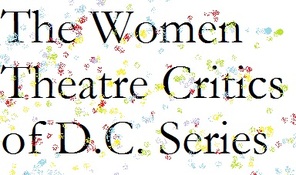 Welcome to the Women Theatre Critics of D.C. Series! Over the next few days, you'll be introduced to a smart, talented and diverse group of women working in the American Theatre as freelance and staff theatre critics, and also as feature writers. Many of these women are writing locally, regionally and nationally. Their combined credits include BroadwayWorld, DC Metro Theatre Arts, DC Theatre Scene, Huffington Post, MD Theatre Guide, Washington City Paper, the Washington Post and the Washington Times. And I admire each of them for efforts, ability and commitment to the theatre. As a theatre artist, advocate, teacher and audience member, I engage in a great deal of critical thinking about theatre. I first learned critical theory and analysis in grad school at the University of Texas Austin while studying under Omi Olomo Osun (Dr. Joni Jones) and Jill Dolan. From them, I learned about the complicated ways in which race and gender politics for and against artists, audience members and critics. On a basic level, when we approach and engage with a piece of theatre we must be open-minded enough to consider and also counter cultural biases that work against women and artists of color. We must be socially aware, racially conscious and establish a more diverse and inclusive cultural literacy. In her blog for the Washington Post, journalist and classical music critic Anne Midgette wrote this about the role and responsibility of the art critic: “The role of a critic is to cover a field. This doesn't mean simply pandering to popular taste. It means doing one's best to convey a sense of what is going on in a given discipline by writing about every possible side of it. It means trying to convey a perspective that a reader who doesn't spend every night going to concerts/plays/films may not be able to gather himself; or offering a thoughtful take that might stimulate a reader who does go to everything to see something in a different light. For part of our role is to foster dialogue and debate. That doesn't mean setting forth judgments of taste in order that readers might fall obediently into line behind us. Quite the contrary: it may mean putting out views that one knows may represent the minority. It means being interested in the thoughts of those who disagree. It means being delighted when someone is powerfully moved by something one didn't like oneself. It also means writing well enough that someone might want to read you -- a goal that's hard to reach if all you're doing is trying to push readers to buy tickets.” For me, this is criticism at its very best and actually, it's what I see Howlround.com accomplishing so masterfully. When I first began these series, I knew that I wanted to connect with the Women Theatre Critics of D.C. I wanted to engage them in a discussion not only about their ideals, standards and passion for the form, but also about the impact they hope to make on the American Theatre. As with my previous series on Playwrights, Directors, Artistic Directors, and Dramaturgs, it is my hope that these interviews will serve others who are making their way as theatre critics and feature writers in the Nation's Capital, and beyond. I also hope it will shed light on the essential role of the critic in the American Theatre and offer a point of entry into their process of engagement. 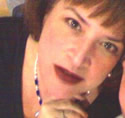 JAYNE BLANCHARD Jayne Blanchard has been a critic covering DC theater for the past 14 years, most recently for DC Theatre Scene and previously for the Washington Times. Prior to that, she was a theater critic in the Twin Cities and a movie reviewer in the Washington area. She is a proud resident of Baltimore. 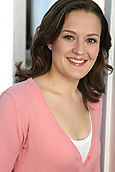 SOPHIA BUSHONG Sophia Bushong is very flattered to have been asked to participate in this series, even though she reviews plays very rarely and usually just for the fun of it. She has been a creative writer, theater geek and actress all of her life. She has a BA in English Literature and Dramatic Arts from Dickinson College. She spent ten wonderful years acting and studying in New York City. She trained at the New Actor's Workshop, The Shakespeare Theatre of New Jersey, the American Globe Theatre Conservatory with John Basil, and with the best Voice for Actors coach ever, Robert Perillo. Favorite roles include: Titania in A Midsummer Night's Dream, STNJ, Shakespeare Live; Sylvia in Sylvia, Lake Placid Center for the Arts; the Angel in Angels In America, Parts I & II, Pendragon Theater; Woman in Statements After an Arrest Under the Immorality Act,Prospect Theater; Madge Larrabee, Sherlock Holmes: The Final Adventure, Arkansas Repertory Theatre, Bernadette in The Misadventures of Julia Child, Upright Citizen's Brigade. A special mention must go to the part of Dissenter in MacRune's Guevara, Mirror Repertory Company, because she was cast in the role by her future husband. Five years into their friendship he sweet-talked her into moving to Washington, DC. Once here, she turned her focus towards writing. She has been a freelance contributor to the Washington City Paper Arts Desk blog for about sixteen months. 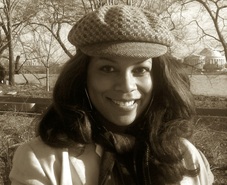 SYDNEY-CHANELE DAWKINS Sydney-Chanele Dawkins is an award-winning feature filmmaker, film curator, film festival and theater producer, and an impassioned advocate for the Arts as a Commissioner and Vice Chair for the Arts for the City of Alexandria,VA. She also is also a staff writer and theater and film reviewer for DC Metro Theater Arts. Sydney-Chanele made her theater producing debut, 'Someone Who'll Watch Over Me' in May 2012 with Port City Playhouse, in Alexandria VA. and just ended a very successful theater producing effort in McLean, VA. with Neil Simon's 'Rumors' for McLean Community Players at Alden Theater. Her next producing effort will be Pearl Cleage's 'Blues for an Alabama Sky'. Co-Chair of the Film Program with Artomatic 2012, and Programmer of Cinema Art Bethesda, Sydney-Chanele is the past Festival Director of the Alexandria Film Festival, the Reel Independent Festival , and Female Shorts Film and Video Showcase. She is active with DC Metro area film festivals, including programming and leadership positions with FilmFest DC, the Washington Jewish Film Festival, Arabian Sights Film Festival, DC Shorts, Rosebud Film Festival, and AFI's Docs 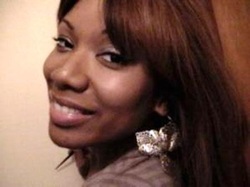 VICTORIA DURHAM Victoria Durham is a writer, spoken word artist and lifelong resident of the DC Metro area. After earning degrees from Temple University (PA) in both Film and African-American Studies, Victoria worked extensively as a freelance talent and production coordinator throughout the local independent film circuit. She also contributed her talents to such companies as Girard Video, BET, The Barrie School, WTTG FOX-5 and the CW (formerly UPN-20). In 2011, after contributing an article to the website of the late author Erica Kennedy, Victoria decided to more seriously pursue a career in arts writing and began penning her first stage play. More significantly, she began working as a freelance arts journalist. In 2012, Victoria covered the ever popular Capital Fringe Festival for the well-established website DC Theatre Scene. That same year she joined the staff of MD Theatre Guide as a contributing writer. 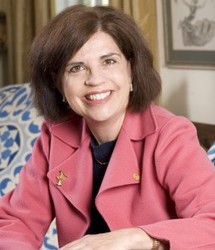 SUSAN GALBRAITH Susan began studying the field of theatre criticism as an assistant to theatre director and critic-at-large Robert Brustein in London 1972-1973. Subsequently, while pursuing a career on stage in New York, Minneapolis, and Boston, Susan continued to write reviews periodically. For the last three years, Susan has worked for DC Theatre Scene, covering theatre and opera for Washington’s premiere on-line arts magazine. Recently she was invited to write dance reviews dance for The Washington Post. Trained as both an actress and dancer, Susan brings diverse perspectives to her writing on performance. She has directed and also performed in repertory theatre, new plays, and experimental cross-over forms of dance-theatre. She served as Artistic Director of Performers Ensemble from 1978 to 1989 including serving as a company member of Peter Sellars’ Boston Shakespeare. In 1994, she co-founded Alliance for New Music-Theatre working collaboratively to develop libretto for operas and musicals and directing new works.  MARLENE HALL Marlene Hall grew up an army brat and has lived all over the world and in Washington, D.C. Marlene graduated from the University of Virginia where she wrote for the Cavalier Daily and was in Air Force ROTC. Commissioned an Air Force officer, she served in Korea, Germany, New Mexico, and Louisiana. Marlene earned two masters degrees while in the Air Force in Management and IO Psych. After leaving active duty, she has worked as a government contractor, freelance writer, public relations executive, and sales for Viridian green energy. She just graduated with her third master's in Public Relations from Georgetown University. Marlene dabbles in improvisational comedy and has taken classes at the famed iO Theater in Chicago. She is very active in the D.C. charity and social scene and contributes her time to veterans' issues including Team Red, White, and Blue, bringing veterans together through social and physical activities. Marlene has been going to plays since she was a little girl and her all time favorite play is "Les Miserables." She covers the plays in the DC area for The Huffington Post and Ask MissA. She love the vibrancy of the theatre in the DC area. She also participates in the GI Film Festival which honors the military through authentic story telling. 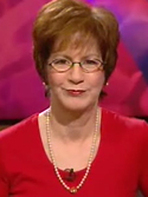 JANE HORWITZ Jane Horwitz has been a regular panelist on WETA TV's critics' roundtable show “Around Town” since 1988. Horwitz wrote the "Backstage" column for The Washington Post's Style section from 1997 to 2011, covering the Washington area theater scene in feature stories and interviews. She currently writes freelance theater reviews for The Washington Post and for Washingtonian magazine's website. Her column The Family Filmgoer appears every Friday in The Washington Post's Weekend section and is syndicated by The Washington Post Writers Group to newspapers around the country. A Chicago area native, Horwitz earned her bachelor's degree from Stanford University and received a master’s from Northwestern University’s Medill School of Journalism. She began her career in radio as a reporter in Springfield, Illinois, then joined the television news department at WFAA TV in Dallas/Fort Worth. After eight years as a reporter and film/theater critic at WFAA, Horwitz married and relocated to Connecticut, and then to the Washington area. She worked on WTTG TV’s “Ten O’ Clock News” as a theater and film critic for four years, co-hosted the national cable program “The Moviegoing Family” on The Learning Channel and became a panelist on WETA's "Around Town." She began writing "The Family Filmgoer" column in 1993. In the 1990s, Horwitz was heard Friday afternoons on WETA 90.9 FM’s “PM Program” in a weekly segment called “Talking Pictures.” She also produced and hosted two pilot film review programs titled “Chicks on Flicks,” that featured a panel of female critics. 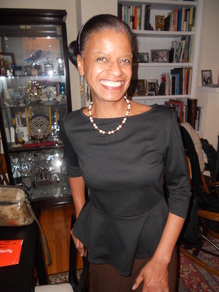 DEBBIE M. JACKSON Debbie is recognized throughout the Center for her creativity, energy and zest for life. In addition to fostering camaraderie within the office, encouraging and contributing to group activities, she makes full use of her theater background at numerous NCHS events, most recently performing as “Sistah D” for Diversity Day. She organized the NCHS Double Dutch Jumpers and she is a walking and jogging coach who has helped many log miles on the trails in University Park. Debbie has performed on plenty of stages from Chicago to Montgomery, AL to Washington, D.C. and organized a dance troop while in college. She is a member of the Black Women Playwrights’ Group with works performed as part of the Source Theater Festival and NYC. She has a Masters in English from the University of Illinois and currently writes for D.C. Theatre Scene.  JENN LARSON Jenn Larsen is one of the founders of We Love DC, a website created by a group of writers dedicated to exploring and celebrating life in the nation's capital. Currently serving as editor-in-chief, she writes about art, theater, and the craft cocktail scene. She is a graduate of the Catholic University of America's drama program where she studied both acting and design, and is a veteran of National Players, the nation's longest running classical touring company. In addition to We Love DC, her theater reviews have been featured on DC Theatre Scene, and she's been profiled by Washingtonian's Capital Comment and My Voice is Strong. An advocate for DC's talented food and drink industry, she's judged the Corcoran Gallery of Art's ARTINI gala, the DC Craft Bartenders Guild's Rickey Month Contest, the Jefferson Hotel's Quill Competition, and is a founding member of LUPEC DC. 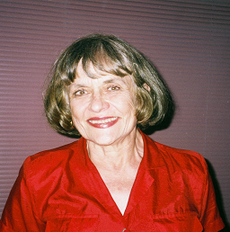 ROSALIND LACY Rosalind Lacy MacLennan, who hails from Los Angeles, has enjoyed writing for DCTheatreScene since 2006, where she covers Washington's Hispanic theatres. A 25-year journalism veteran, with newspapers such as the Pittsburgh-Post Gazette, the Butler Eagle in Pennsylvania, the Suburban Newspapers of Northern New Jersey, Rosalind won a MD-DC press award for the Montgomery Journal in 1999. Acting started her career at Occidental College in L.A. Rosalind switched to U.C.L.A. for their theater and film departments and supplemented by joining the acting workshop of Martin Landau, from the Mission Impossible TV series. Since moving to the Washington area, she has reviewed theatre and classical music for the Gazette Newspapers, until she joined DCTheatrescene.com. Invited to join the National League of American Pen Women in 2007, several of Rosalind's poems have been published and won awards. A former board member of FootlightsDC, Rosalind is an aficionado of Spanish theater history. As a community activist, she attended Montgomery College, took law courses for three years and earned a paralegal degree. "I always wanted to be a lawyer or a novelist or both, but the draw of theatre is like a magnet." Reviewing and writing is something she has to do, or die. 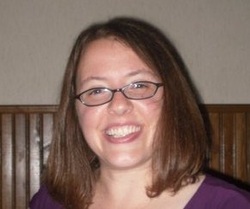 JENNIFER PERRY Jennifer Perry hails from Liverpool, New York and has been a DC resident since 2001. When not attending countless theatre, concert, and cabaret performances in the area and in New York, she works for the US Federal Government as an analyst and previously worked in non-profit research and advocacy organizations. Jennifer previously wrote for Maryland Theatre Guide and DC Metro Theater Arts and continues to review theatre and cabaret for BroadwayWorld and DC Theatre Scene. Ms. Perry earned her B.A. in Sociology and Spanish (Linguistics) from Houghton College in Houghton, NY and her M.A. in International Affairs from the School of International Service at American University in Washington DC where she focused on international security and ethnic conflict. 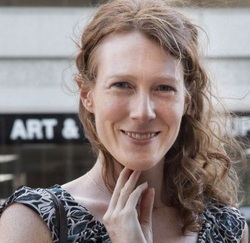 REBECCA RITZEL Rebecca J. Ritzel is a writing professor and freelance journalist who lives in Alexandria, Va. Her cultural reporting has been featured in more than two dozen American, British and Canadian publications. Locally, she writes about dance for The Washington Post and theater for City Paper. She has taught literary journalism in the MFA program at American University and currently teaches in the Professional Writing Program at the University of Maryland. Ritzel is originally from Baltimore and earned her master's degree in arts journalism from Syracuse University. Follow her on Twitter @rjreporter 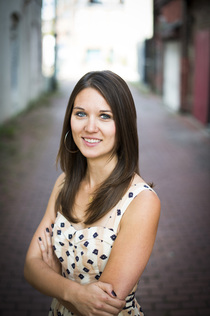 JOJO RUF Jojo Ruf is the General Manager of the National New Play Network, an alliance of nonprofit theaters across the US that champions the development, production and continued life of new plays, and the Coordinating Producer for the Laboratory for Global Performance and Politics at Georgetown University. She is a freelance writer for theatreWashington, a Teaching Artist for Ford’s Theatre, and has worked with Arena Stage, the Kennedy Center, Theater J, the Provincetown Tennessee Williams Theater Festival, and Georgetown University as a freelance producer and director. Jojo graduated from Georgetown University with a dual degree in English and Theater and Performance Studies. In 2010 she assistant directed and co-adapted In Search of Duende: The Ballad of Federico Garcia Lorca as part of the UNESCO/ITI World Festival of Theater Schools in Peru, and represented Georgetown as the lone US delegation among representatives from dozens of the world’s leading theater academies. She was the Coordinating Producer for the Tennessee Williams Centennial Festival, presented by Georgetown University and Arena Stage, and served as the Coordinator for Theater J’s Spinozium and other Beyond the Stage events for New Jerusalem: The Interrogation of Baruch de Spinoza. She also produced Will the Circle be Unbroken: Death, Rebirth, and Hunger for a Faith, a Georgetown University/Arena Stage Collaboration. "After one of my plays came out, I had mixed reviews, some bad and some good. One day, it dawned on me. I thought, "I wrote a play and he wrote a review, and that's the difference between him and me." ~~Steve Martin
I love this quote by Steve Martin. He might have meant something entirely different by it, but to me it reads that each writer made an equal contribution to the American Theatre. The difference in their art is one of form. It gave me such peace when I read it. There is a scene in THE HAMPTON YEARS when an art critic admonishes a mural painted by John Biggers. The mural is the Dying Soldier, pictured above. The review is scathing, racially charged and reflective of the prejudicial standards of the time period. John Biggers paints a mural. This art critic writes a review. However, the difference between them is vast. Remember, it's the 1940’s. Jim Crow laws dictate every aspect of race relations and the world is not yet ready for Black Artists to paint their experiences or reflect society in a critical way. The critic upholds the status quo and I believe he’s doing so in an attempt to save the future of art. It was a thrilling scene to write. Because, however much I agree or disagree with the critic, this is a scene about honor, integrity, a desire to uphold a standard and a great love for art. On Wednesday, my play THE HAMPTONS YEARS will open to previews at Theater J. Set at Virginia’s Hampton University during World War II, my play follows the growth and development of African American artists John Biggers and Samella Lewis under the tutelage of Austrian Jewish refugee painter and educator Viktor Lowenfeld. The process of getting this script from page-to-stage has been nothing short of extraordinary. My values and writing skills have been tested, honed and defined. What’s more, I’ve found myself living the plot of my play when UDC announced that it was discontinuing the Theater Arts Program. And working with Shirley Serotsky (Theater J’s Associate Artistic Director) and Otis Ramsey-Zoe (Dramaturg) has been … well, every playwright on this planet should be so fortunate. As with every play I’ve ever written, I have such great hopes for it. I hope that the lives and experiences of these artists inspire everyone who has ever had a dream and faced great challenges to see them realized. I hope that writers of color feel empowered to tell the stories of their people. I hope that theatres feel encouraged not only to program plays written by women, but also plays written by Black playwrights that explore Black history and culture. We have four preview performances before opening night. Four performances to work out any last minute kinks in the production or the script before press is invited. Each night, audiences will have two hours to experience and evaluate what it took me a year and seven months, but really my entire life, to write. I plan to watch it Wednesday and Thursday before working through additional rewrites. I’ll repeat this process on Saturday and Sunday into Monday. This way, I’m not writing on impulse. And this way, I can meet opening night with equal amounts of joy, fear, and confidence. Joy, because this will be my first regional production. Fear, because this will be my first regional production. Confidence, because I’ve worked my ass off and so has everyone else on this artistic and production team. Three months after the play closes, I will read what the critics have said about it. Now, don’t get me wrong, I enjoy critical analysis. I believe the role of the critic is essential. I believe that artists and critics should be conscious of the work we create and know how to frame it within a contemporary, historical, socio-economic, political, racial/ethnic and geographical context. However, because art is inextricably linked to commerce, the relationship between the artist and the critics is a troubled one. The weight of a review is measured in dollar signs and its merit is based on how well or poorly a playwright can trade their efforts on audience attendance, grants and donations. And just as problematic, for a woman playwright of color, is America's longstanding issues with race and gender. Especially, if a reviewer lacks social awareness and race consciousness. But I believe our very best theatre critics write from a place of honor, integrity, a desire to uphold a standard and a great love for theatre. And this is why I've been so excited to connect with the Women Theatre Critics of D.C. and present this series. In my next post, I'll introduce you to the women being featured and share their stories with you over the course of the next few days. I hope you'll enjoy learning about their lives, careers and ambitions as much as I have. On Saturday, June 1st and Sunday, June 2nd, The Hub Theatre will present their first ever Play Fest, a staged reading festival showcasing new plays by contemporary. Helen Pafumi, Artistic Director of the Hub Theatre, and I had a chance to connect about what inspired this festival and why these four playwrights are essential voices in the American Theatre. 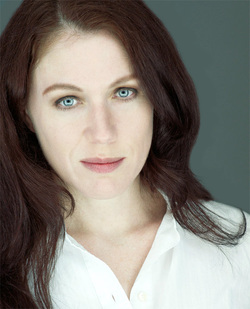 JACQUELINE LAWTON: What inspired this festival of new plays? HELEN PAFUMI: I don't like selecting plays in a vacuum. I know what kinds of plays I am drawn to and my gut tells me what I think will work, but, in the end, The Hub is a service organization. Part of our mission is to share plays that celebrate our common humanity. There is something intangible in what I look for in plays, something that speaks to the mystery of human connection. When I think it is there, then I want to share that work with my community. With an audience in the room, I can tell very quickly in a reading if that piece is there. In the past we have spread out our readings over the course of several months. I look forward to a concentrated weekend of hearing these plays and the conversations they spark. All four of these shows grasp something which I wish was more common in American writers today - hope. SHE RODE HORSES LIKE THE STOCK EXCHANGE JEL: What excited you about programming SHE RODE HORSES LIKE THE STOCK EXCHANGE by Amelia Roper? HP: As artists, I think we are still contending with how to talk about the economic crisis that hit our country and with the corporations, politics and people who brought it on. As well as with our society's collective ignorance of warning signs. Amelia's play illustrates how well the blinders were on, and does so with humor until the truth is undeniable. And yet it still has a sense of possibility - even when everything crumbles around you. JEL: Why is she an essential voice in the American Theatre? HP: She has a quick pacing and wit that keeps the play moving. This is the first of her work that I have read, and her artful dialogue and humor make me want to read more. Her writing feels like you are eavesdropping on a gem of a conversation. JEL: What do you hope audiences will walk away thinking about after experiencing this play? HP: That we cannot let our future be ripped away by our own ignorance and inaction. And that there is is still hope for us after coming out of a loss of our material world; that we can transcend our economic definition and be freed from it. Experience She Rode Horses Like the Stock Exchange by Amelia Roper on Saturday, June 1 at 1 PM. All events are free, but seating is limited. Click here to reserve a ticket!  Amelia Roper is an Australian playwright currently studying at the Yale School of Drama. Her work has been developed at Berkeley Repertory Theatre, the Old Vic (London), Oregon Shakespeare Festival, the National New Play Network, Bay Area Playwrights Festival, the Moscow Playwright & Director Center (Russia). Her work has been shown in Australia at the Melbourne Theatre Company, La Mama Theatre, FreshInk and World Interplay. Her plays have been produced at Barrington Stage Company, St Martins Youth Arts Centre, The Melbourne Arts Centre, The Dog Theatre and the Yale Cabaret. Awards include the Cheryl Crawford Scholarship (Yale 2012), the Howard Stein Scholarship (Yale 2011), the St Martins Emerging Playwrights’ Award (Australia 2007), a MUST National Playwriting Award (Australia, 2003), two Ian Potter Cultural Awards (2010/11) and a Dame Joan Sutherland Cultural Trust Award from the American Australian Association. Roper is a proud member of the Dramatists Guild of America. THE ELECTRIC BABY JEL: What excited you about programming THE ELECTRIC BABY by Stefanie Zadravec? HP: I saw a very early reading of this play back when TFA was working on it. Stefanie brought it back to my attention recently, and I was so thrilled with the work she had done on it - making story lines clearer and characters richer. I love how these different lost people find their way to each other. It's beautiful how she has them intertwine and fulfill, sometimes happily, sometimes painfully, each other's destiny. She also has a magical element to her writing - which I am a sucker for. JEL: Why is she an essential voice in the American Theatre? HP: I find her writing to be a beautiful mixture of complex and simple. The idea that nothing is easy in life, and yet it's a story that can be artfully told. I also see redemption in her characters - oh how I am attracted to writers who let us see moments of great personal change on stage. JEL: What do you hope audiences will walk away thinking about after experiencing this play? HP: A sense of connectedness and importance in their lives. I hope they will feel the deep and beautiful pang of this play - that our most precious treasures can be taken away but the sweetness of them echoes on. Experience The Electric Baby by Stefanie Zadravec on Saturday, June 1 at 4 PM. All events are free, but seating is limited. Click here to reserve a ticket! 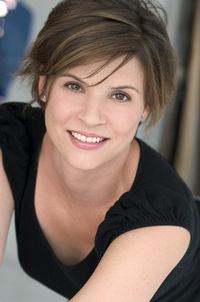 Stefanie Zadravec is a resident playwright at New Dramatists and a 2012-2013 Lark Play Development Center Playwright Workshop Fellow. Her plays have been developed at The Kennedy Center, PlayPenn, The Working Theater, Oregon Shakespeare Festival and The Women’s Project among others. Honey Brown Eyes (Theater J, Washington D.C., Working Theater, NYC) received the 2009 Helen Hayes Award for Outstanding New Play and was published in American Theatre magazine. The Electric Baby (Quantum Theatre, Pittsburgh) received the Women in Arts and Media Coalition’s 2011 Collaboration Award. Save Me (The Barrow Group) received the Baltimore Playwrights Festival Outstanding New Play Award as well as the Phoenix Theatre’s National Playwriting Award. Stefanie’s collaborations include: We Play for the Gods (The Women’s Project, NYC), The Fear Project (The Barrow Group, NYC), 167 Tongues (Theatre 167, NYC), You Are Now The Owner This Suitcase (Theatre 167, NYC). Awards and Residencies include: Dramatists Guild Fellowship, Women’s Project Lab, a Playwrights Realm Fellowship, Sustainable Arts Foundation Writing Award, The Sewanee Writers Conference Dakin Fellowship, and a NYSCA individual artist grant. She is currently working on commissions for The Working Theater, Oregon Shakespeare Festival and Epic Theatre Ensemble, and teaching playwriting at Primary Stages’ ESPA school. Upcoming: The Electric Baby at Two River Theater Co. and Rivendell Theatre Ensemble in Chicago, Spring 2013 www.szadravec.com FAILURE: A LOVE STORY JEL: What excited you about programming FAILURE: A LOVE STORY by Philip Dawkins? HP: This piece is so much fun. Philip's FAILURE: A LOVE STORY allows a heightened theatricality and takes a stylistic risk. I love the rich way he blends fable and old movie qualities with a great comic wit but still beds the entire story in an honest family interaction and a classic love tale. JEL: Why is he an essential voice in the American Theatre? HP: Anybody who is willing to take a risk with their writing the way he does should be nourished. He adds variety to the theatrical landscape. It is also so important for us to have writers who can take on comedy with heart and truth. JEL: What do you hope audiences will walk away thinking about after experiencing this play? HP: That we are shaped by the richness of our family background. That love can happen in an instant or grow over a long time, and that it lasts long after we are gone. Experience Failure: A Love Story by Philip Dawkins on Sunday, June 2 at 1 PM. All events are free, but seating is limited. Click here to reserve a ticket! 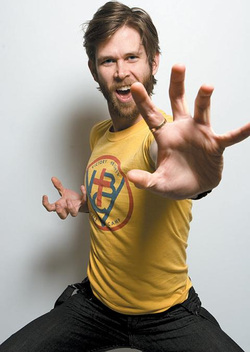 Philip Dawkins' critically-acclaimed play The Homosexuals received a Joseph Jefferson Nomination for New Work after its world premiere with About Face Theatre in the summer of 2011, under the direction of Bonnie Metzgar. His playFailure: A Love Story premiered at Victory Gardens Theater under the direction of Seth Bockley, with productions slated at Azuka Theatre in Philadelphia and Illinois Shakespeare Festival in Bloomington-Normal in Summer 2013. His play Miss Marx or The Involuntary Side Effect of Livingreceived a staged reading as part of Steppenwolf's 2010 First Look Series. Other credits: Dead Letter Office (Dog and Pony Theatre); Yes To Everything! (Chicago, New York, California, DC); Perfect (The Side Project);Ugly Baby (Chicago Opera Vanguard/Strawdog Theatre Company); A Still Life In Color (T.U.T.A. Company). His plays for young folks are published through Playscripts, Inc. A graduate of Loyola University, Chicago, Mr. Dawkins is an Artistic Associate of About Face Theatre, an Ensemble Playwright at Victory Gardens, and a founding member of Chicago Opera Vanguard. Mr. Dawkins teaches playwriting at Northwestern University and through the Victory Gardens ACCESS Program for writers with disabilities. He also teaches Kung Fu to little Chicago kids through Rising Phoenix Kung Fu. Hi-Yah! CHING CHONG CHINAMAN JEL: What excited you about programming CHING CHONG CHINAMAN by Lauren Yee? HP: It's no secret that I love Lauren Yee's writing, as we just closed A MAN, HIS WIFE, AND HIS HAT. CHING CHONG CHINAMAN is very different but still retains what I love about her work - its unique, absurd and magical look at the human condition. The play is incredibly irreverent, but she brings the audience along with her so that we can all laugh together at our follies. JEL: Why is she an essential voice in the American Theatre? HP: Lauren has an innate sense of structure and character, so she is able to throw caution to the wind when she writes. Her work feels uninhibited. The result is a full exploration of cultural identity. She is also writing stories that reach the gamut of our social and cultural spectrum. And she is funny - has an amazing sense of humor and hope. JEL: What do you hope audiences will walk away thinking about after experiencing this play? HP: That our cultural history is more than just face value, and that it will be lost if we don't work to keep it. The play also highlights that cultural myopia and prejudice can happen to anyone, absolutely anyone. Experience Ching Chong Chinaman by Lauren Yee on Sunday, June 2 at 4 PM. All events are free, but seating is limited. Click here to reserve a ticket!  Lauren Yee’s work explores the line between humor and heartbreak to create wildly theatrical plays filled with magical realism. Her plays include Ching Chong Chinaman; Crevice; Hookman; in a word; A Man, his Wife, and his Hat; Samsara; and The Tiger Among Us. Her work has been produced at AlterTheater, Artists at Play, City Lights Theatre Company, Company One, fu-GEN, the Hub Theatre, Impact Theatre, Moxie Theatre, Mu Performing Arts, Pan Asian Rep, SIS Productions, and others. Lauren’s plays have been also developed at Lincoln Center Theatre/LCT3, The Magic Theatre, The Public Theater, Rattlestick Playwrights Theatre, Victory Gardens Theatre, Williamstown Theatre Festival, Aurora Theatre, the Bay Area Playwrights Festival, the Hangar Theatre, Kitchen Dog Theatre, Orlando Shakespeare Festival, and PlayPenn. She is a MAP Fund grantee and has been a Dramatists Guild fellow, a MacDowell fellow, and Public Theater EWG member. She was a finalist for the Jerome, the PONY, the Princess Grace, and the Wasserstein Prize. She is a Time Warner Fellow at the Women’s Project Playwrights Lab and a member of the Ma-Yi Theatre Writers Lab, as well as the Shank playwright-in-residence at Second Stage Theatre. She is currently under commission from Lincoln Center Theatre/LCT3 and Encore Theatre Company (with support from the Gerbode Foundation. BA: Yale. MFA: UCSD.  The Hub Theatre is an award winning, professional non-profit theatre making its home in Fairfax County, Virginia. The Hub Theatre is a member Theatre Washington. The Hub has received grants from Target, the Fink Foundation, the Arts Council of Fairfax, The Friends of Lake Anne, Virginia Commission for the Arts, the Arts Council of Fairfax, Integrity Applications, and Booz Allen Hamilton. Mission The Hub Theatre endeavors to produce work that highlights our common humanity, providing a theatrical experience that is at once challenging and inclusive. We strive to be the physical center of a dynamic circle of story, art, and community, to create the transcendent exchange unique to live theatre. On Saturday, June 1st and Sunday, June 2nd, The Hub Theatre will present their first ever Play Fest, a staged reading festival showcasing new plays by contemporary. “These are adventurous plays that are quirky and funny, and full of heart and sometimes heartache,” said Helen Pafumi, Hub’s artistic director in a recent feature. “Staged readings are a wonderful way to introduce plays or playwrights to our community.” In addition to four staged readings, the Play Fest will feature two panel discussions about new play development and gender parity in the American theatre. All events are free, but seating is limited. Click here to reserve a ticket! Here's the line-up: Saturday, June 1 at 1 PM She Rode Horses Like the Stock Exchange by Amelia Roper directed by Robert Lufty featuring Laura Baranik, Patrick Foley, Heather Howard, Jon Odom, and Eric Tucker About the Play In a nice New England park, in a nice New England city, two nice New England couples try very, very hard to be nice to each other, while the world around them falls apart. An absurdly funny and terrifying ride through downsized, foreclosed America. Saturday, June 1 at 3 PM Panel Discussion - Gender Parity in American Theatre Moderated by Jacqueline Lawton with panelists Eleanor Holdridge (Freelance Director, Catholic University Head of MFA Directing Programs), Michael Dove (Artistic Director, Forum Theatre), and Helen Pafumi (Playwright and Artistic Director, The Hub Theatre). While female theatre artists make up over 50% of those involved in the theatre, why are so few female playwrights being produced? Why so few female directors helming shows? Listen to our esteemed panelists discuss the gender divide and what theaters can do to address the issues. Saturday, June 1 at 4 PM The Electric Baby by Stephanie Zadrevec directed by Kasi Campbell featuring Peter Boyer, Jimmy Flanagan, Nanna Ingvarsson, Rana Kay, Leo Sheridan and Mary Beth Wise. About the Play In this dazzling new play, three very different couples discover that their lives are connected in ways that none of them could ever imagine. A middle-aged couple confronts the secrets of their troubled marriage. A young woman becomes attached—literally—by a pair of pink, fluffy handcuffs to the hopeful young man who secretly loves her. And a Romanian mother and Nigerian father care for their child, who glows like the moon—and brings everyone together to experience the power of storytelling, the importance of community, and the hope of new beginnings. Sunday, June 2 at 1 PM Failure: A Love Story by Philip Dawkins directed by Helen Pafumi featuring Michael Kevin Darnall, Kristen Garaffo, Katie Jeffries, Rose McConnell, Janel Miley, Noah Mitchel, Belen Pifel, Casie Platt and Chris Stinson About the Play A magical, musical fable about the triumphs and aspirations of three sisters living in the rickety two-story building by the Chicago River which was the Fail family home and clock shop in 1928. Nelly was the first to die, followed soon after by sisters, Jenny June and Gerty. As with many unforeseen circumstances in life—blunt objects, disappearances and consumption—they never saw death coming. This profoundly funny and moving story reminds us that in the end, all that remains is love. Sunday, June 2 at 3 PM Panel Discussion - New Play Development Moderated by Kristen LePine with panelists Anne McCaw (Executive Director, The Inkwell), Allyson Currin (Playwright in Residence, Theatre J), Helen Pafumi (Playwright and Artistic Director, The Hub Theatre), Randy Baker (Playwright and Co Artistic Director, Rorschach Theatre), Jojo Ruf (General Manager, National New Play Network). What goes into developing a new play for production? The Hub gathers theatre experts from across the Washington Metro area to share their insights about the challenges, the process, and their successes in selecting and developing new work for production. Sunday, June 2 at 4 PM Ching Chong Chinaman by Lauren Yee directed by Lee Mikeska Gardner featuring Jennifer Knight, Hazel Loranzo, MiRann Powell, Al Twanmo, Jonathan Wong, Jacob Yeh and Nicholas Yenson About the Play Turning every cliché about Asian American identity on its head, CHING CHONG CHINAMAN introduces us to the all-American Wong family: Ed the patriarch loves to golf and mom Grace wants another child; Desdemona obsesses over early admission into Princeton while her brother Upton is focused on World of Warcraft superstardom. To ease the burden of homework and free up more time for training, Upton acquires an indentured servant from China. Life in the Wong household is turned upside down with the arrival of Jinqiang ("Ching Chong")... who harbors his own American dreams! All events are free, but seating is limited. Click here to reserve a ticket!  The Hub Theatre is an award winning, professional non-profit theatre making its home in Fairfax County, Virginia. The Hub Theatre is a member Theatre Washington. The Hub has received grants from Target, the Fink Foundation, the Arts Council of Fairfax, The Friends of Lake Anne, Virginia Commission for the Arts, the Arts Council of Fairfax, Integrity Applications, and Booz Allen Hamilton. Mission The Hub Theatre endeavors to produce work that highlights our common humanity, providing a theatrical experience that is at once challenging and inclusive. We strive to be the physical center of a dynamic circle of story, art, and community, to create the transcendent exchange unique to live theatre.  On Thursday, May 23rd at 11:00am, I'll be joining We Act Radio host Thomas Byrd along with Deborah Simmons, award-winning correspondent with the Washington Times; Julia E. Christian, Anacostia Playhouse's Managing Director; Katie Ryan, Theatre Alliance Education and Outreach Director; and Virginia Spatz, The Education Town Hall's feature reporter, for an in-depth discussion on Arts Education versus Job Training at public universities and in tough economic times on The Education Town Hall radio show. Click here to listen live. The Education Town Hall with Thomas Byrd is the premiere Local Live Wire show on We Act Radio, WPWC broadcasting from Historic Anacostia in Washington, DC. The show is a weekly one-hour forum dedicated to every aspect of educating our students. Tune in: Thursday mornings at 11:00 on 1480 AM or on-line. Be sure to visit WeActEd, the Education Town Hall blog and listen for us on MixCloud or here to listen live. We Act Radio is a media corporation that combines broadcast and new media to deliver our shows in the formats people use most. You can follow their shows by streaming them at WeActRadio.com, listening on AM and FM radio stations around the country, downloading them via podcast or on iTunes, or subscribing to their YouTube channel. Click here to listen live. ABOUT THE HOST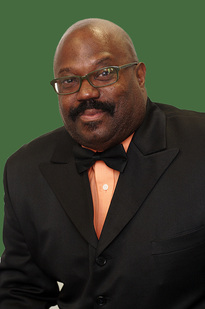 THOMAS BYRD For the past 15 months Thomas K Byrd has Hosted and Produced the Education Town Hall Show on We Act Radio. He created the show to facilitate the construction of effective community supported solutions and to foster the incitement of strategic transformative actions. During this time Thomas has been pleased to be able to provide access to the public square for all stakeholders. He is most proud of being able to provide a megaphone for the voiceless to talk back to power. Thomas Byrd believes that advocating for quality education is not an act only limited to policy makers, non-profit organizations, parents and those in the education field. Education is the great equalizer among all distinctions in society, especially for people of color, and the entire community, even those like himself without children, should be engaged in education reform. ABOUT THE GUESTS JULIA CHRISTIAN Julia E. Christian is the Chief Operating Officer at Anacostia Playhouse and the former managing director at H Street Playhouse and the Theater Alliance. Prior to that, she was Executive Director at CHAMPS - Capitol Hill's Chamber of Commerce. She studied Fine Arts at St. Mary's College of Maryland. 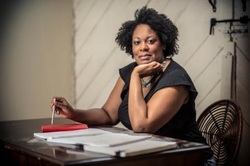 JACQUELINE E. LAWTON Jacqueline E. Lawton was named one of 30 of the nation's leading black playwrights by Arena Stage’s American Voices New Play Institute. Her plays include: Anna K; Blood-bound and Tongue-tied; Deep Belly Beautiful;The Devil’s Sweet Water; The Hampton Years; Ira Aldridge: the African Roscius; Lions of Industry, Mothers of Invention; Love Brothers Serenade (2013 semi-finalist for the Eugene O’Neill Theater Center’s National Playwrights Conference), Mad Breed, and Our Man Beverly Snow. She is a 2012 TCG Young Leaders of Color award recipient and a National New Play Network (NNPN) Playwright Alumna. She has been recognized as a semi-finalist for the Eugene O’Neill Theater Center’s National Playwrights Conference. A member of Arena Stage's Playwright's Arena and the Dramatist Guild of America, Ms. Lawton currently resides in Washington, D.C. 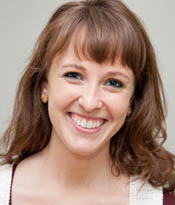 KATIE RYAN Katie is a Rhode Island native and American University graduate. She also works as the Youth and Outreach Coordinator at The Theatre Lab and as the co-founder of Pamoja Products, a non-profit company that provides a global market for alternative income projects in East Africa. Katie is thrilled to join Theatre Alliance. She sees her position as Education and Outreach Director as an opportunity to instill in the next generation of artists a desire to make positive change in their communities, both socially and politically. 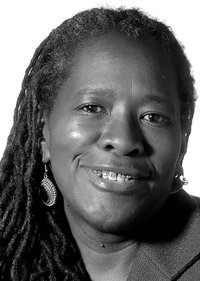 DEBORAH SIMMONS Award-winning opinion writer Deborah Simmons is a senior correspondent who reports on City Hall and writes about education, culture, sports and family-related topics. Mrs. Simmons has worked at several newspapers, and since joining The Washington Times in 1985, has served as editorial-page editor and features editor and on the metro desk. She has taught copy editing at the University of Maryland at College Park. Mrs. Simmons has appeared on BET's “Lead Story,” “Real Time with Bill Maher” and Mr. Maher's “Politically Incorrect,” “America's Black Forum,” Fox News' “The O'Reilly Factor,” “The Right Side with Armstrong Williams,” C-SPAN's “Washington Journal,” and “This is America with Dennis Wholey.” She also has been a guest radio commentator on NPR, WAMU, WMAL and WOL. Mrs. Simmons attended the University of the District of Columbia and Trinity College. 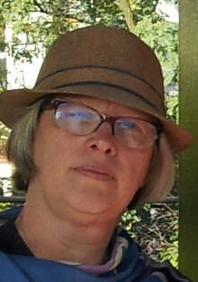 VIRGINIA SPATZ Virginia Avniel Spatz is a writer and activist in Washington, DC. She is feature reporter on the Education Town Hall and helps produce The Politics of Health, both on We Act Radio (WPWC 1480 AM), and often contributes to East of the River magazine. She blogs on Jewish topics at Song Every Day. |
My BlogI'm a playwright, dramaturg, and teaching artist. It is here where you'll find my queries and musings on life, theater and the world. My posts advocate for diversity, inclusion, and equity in the American Theatre and updates on my own work. Please enjoy!
Categories
All
Archives
June 2020
Reading List
|
